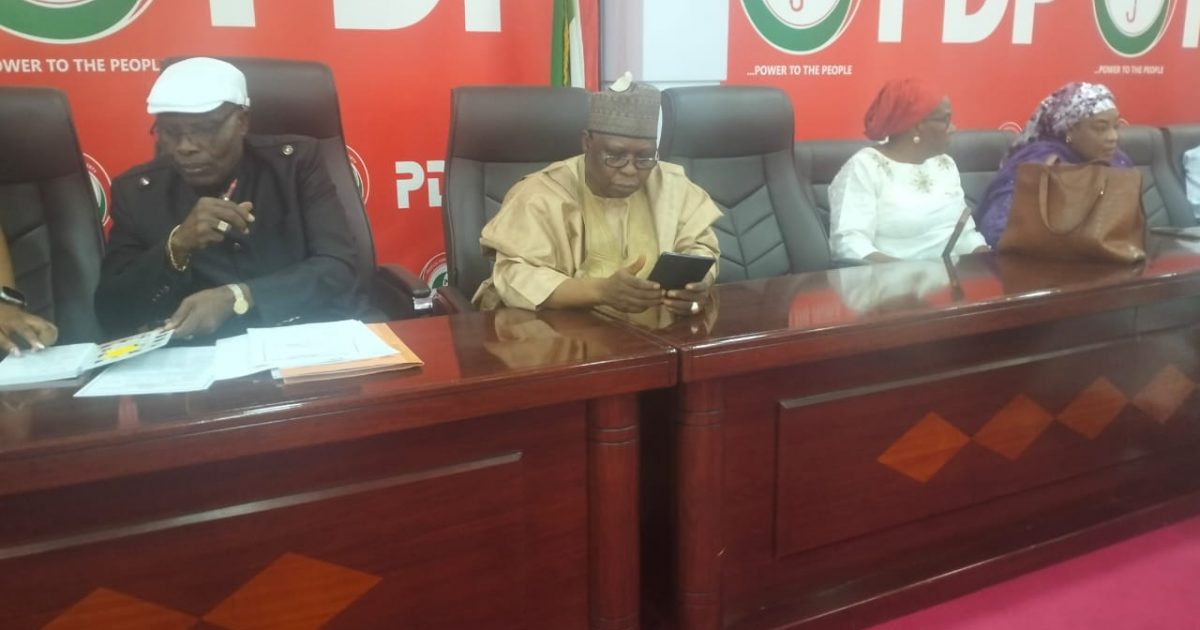The Peoples Democratic Party (PDP) remains engulfed in a leadership crisis as continuous postponements of its National Executive Committee (NEC) meetings fuel discontent among party members.
The delays have hindered the party’s ability to address critical issues, including the appointment of a substantive National Chairman to replace the acting chairman, Umar Damagum.
The latest postponement came on Friday when the PDP announced an indefinite delay in the NEC meeting originally scheduled for November 28.
According to PDP National Secretary, Senator Samuel Anyanwu, the decision was made to allow party leaders to attend the funeral of Pastor Mrs. Patience Umo Eno, the late First Lady of Akwa Ibom State.
However, the move has drawn sharp criticism from party members accusing the National Working Committee (NWC) of stalling for ulterior motives.
The NEC meeting, initially planned during the party’s 98th session in April, has faced multiple delays. From its original date of August 15, it was rescheduled to October 24, and then to November 28.
The delays have frustrated many party members, who view the postponements as a calculated strategy to keep Damagum in power until the party’s national convention in 2025.
READ ALSO: Opposition lawmakers call for reconstitution of PDP leadership amid allegations of collusion with APC
Damagum, a known loyalist of Minister of the Federal Capital Territory Nyesom Wike, reportedly has the support of at least four of the PDP’s 13 governors.
However, another faction, loyal to former Vice President Atiku Abubakar, is pushing for Damagum’s removal before March 2025.
The crisis has sparked accusations of constitutional violations. Former PDP National Publicity Secretary, Kola Ologbondiyan, criticized the NWC for sidelining the North Central zone, which he argues has the rightful claim to complete the suspended tenure of former chairman Iyorchia Ayu.
“It is an aberration that undermines the party’s constitutional order,” Ologbondiyan said during a meeting with North Central youths in Abuja. “The continuous tenure of Damagum only serves to deepen the crisis in the PDP.”
Further complicating matters are allegations of anti-party activities. PDP lawmaker Ikenga Ugochinyere accused Damagum and Senator Anyanwu of secretly meeting with officials from the ruling All Progressives Congress (APC).
On social media, Ugochinyere claimed the meeting was a plot to weaken the PDP and called for the immediate removal of those involved.
“When a party’s chairman and secretary meet secretly with the ruling government, it signals irredeemable doom,” Ugochinyere wrote.
Some analysts believe the leadership crisis is tied to the 2027 general elections, with PDP governors allegedly prioritizing their presidential and vice-presidential ambitions over the party’s stability.
Political activist Austin Okai criticized the governors for playing “double standards” and failing to address the party’s leadership issues. “The governors are fighting for their selfish interests,” Okai said. “If they are serious, they know what to do to fix the party.”
Okai also alleged that the APC is actively working to destabilize opposition parties, including the PDP and Labour Party. “The APC knows that if PDP regains strength, it could challenge the ruling party’s poor governance,” he added.
In a bid to salvage the party, the PDP Governors’ Forum, chaired by Governor Bala Mohammed of Bauchi State, issued a communique on Saturday urging the NWC to convene the NEC by February 2025.
“The forum advises the NWC to call a NEC meeting by the first week of February to address existential problems confronting the party,” Mohammed said. The timeline includes resolving leadership disputes and pending litigation.
The prolonged crisis poses significant challenges for the PDP as it seeks to rebuild its relevance ahead of the 2027 elections. With no resolution in sight, the party risks further alienation of its members and the erosion of public trust

 Health6 days ago
Health6 days ago
 Entertainment1 week ago
Entertainment1 week ago
 Crime6 days ago
Crime6 days ago
 Education1 week ago
Education1 week ago
 Health1 week ago
Health1 week ago
 Comments and Issues7 days ago
Comments and Issues7 days ago
 Football1 week ago
Football1 week ago
 Latest7 days ago
Latest7 days ago

